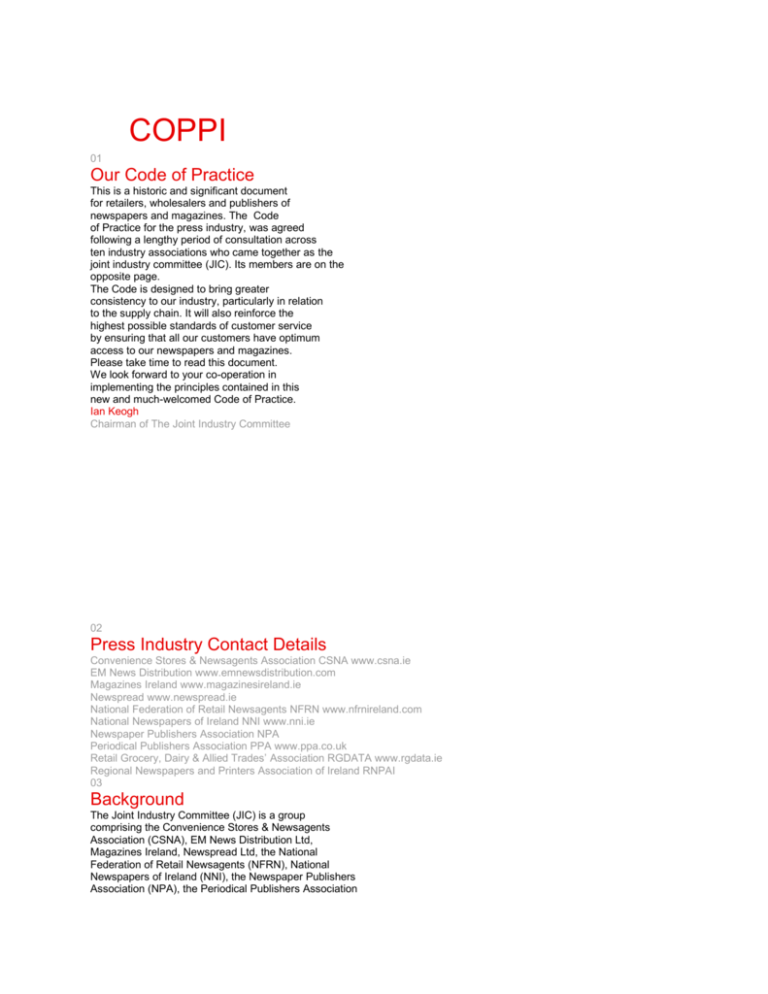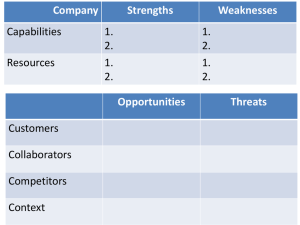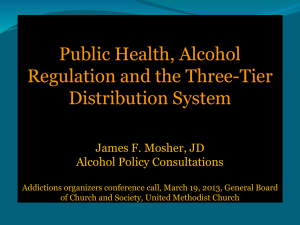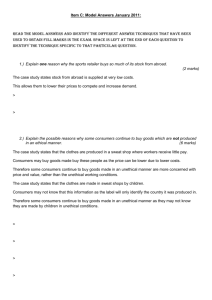COPPI-Review-28.8.13
advertisement

CCOPPI 01 Our Code of Practice This is a historic and significant document for retailers, wholesalers and publishers of newspapers and magazines. The Code of Practice for the press industry, was agreed following a lengthy period of consultation across ten industry associations who came together as the joint industry committee (JIC). Its members are on the opposite page. The Code is designed to bring greater consistency to our industry, particularly in relation to the supply chain. It will also reinforce the highest possible standards of customer service by ensuring that all our customers have optimum access to our newspapers and magazines. Please take time to read this document. We look forward to your co-operation in implementing the principles contained in this new and much-welcomed Code of Practice. Ian Keogh Chairman of The Joint Industry Committee Index Preface 04 Principle 04 1. Terms and Conditions of Supply 05 2. Supply Management Standards 05 3. Delivery Timeframes 06 4. Delivery Standards 07 5. Unsolds Returns Management 08 6. Customer Service 09 7. Communications 10 8. Invoicing 11 9. IT Utilisation 12 10. Compliance & Complaints 12 Complaints’ Process Guidelines 13 Glossary of Trade Terms 14 02 Press Industry Contact Details Convenience Stores & Newsagents Association CSNA www.csna.ie EM News Distribution www.emnewsdistribution.com Magazines Ireland www.magazinesireland.ie Newspread www.newspread.ie National Federation of Retail Newsagents NFRN www.nfrnireland.com National Newspapers of Ireland NNI www.nni.ie Newspaper Publishers Association NPA Periodical Publishers Association PPA www.ppa.co.uk Retail Grocery, Dairy & Allied Trades’ Association RGDATA www.rgdata.ie Regional Newspapers and Printers Association of Ireland RNPAI 03 Background The Joint Industry Committee (JIC) is a group comprising the Convenience Stores & Newsagents Association (CSNA), EM News Distribution Ltd, Magazines Ireland, Newspread Ltd, the National Federation of Retail Newsagents (NFRN), National Newspapers of Ireland (NNI), the Newspaper Publishers Association (NPA), the Periodical Publishers Association (PPA), the Retail Grocery Dairy & Allied Trades Association (RGDATA) and the Regional Newspapers and Printers Association of Ireland (RNPAI). JIC was launched in November, 2008, with a mandate to address and find solutions for a range of industry issues via self-regulation, rather than statutory intervention. Through discussion and co-operation, JIC hopes to create a strong, cohesive relationship between retailers, wholesalers and publishers that will ensure the workings of the industry can be carried out more efficiently – and with significant environmental benefits. 04 Preface A healthy, diverse and competitive press industry is essential to any modern democracy. To ensure that diversity exists in Ireland, newspaper and magazine readers must have easy access to the publications of their choice. This means that readers must be able to access the publications that they wish to receive from the widest selection of outlets possible. It also means that retailers should be facilitated and supported to provide new publications that are likely to be of interest to readers. Therefore, in order for consumers to be served efficiently, there must be co-operation between publishers, wholesalers and retailers. The Code of Practice for the Press Industry (COPPI) sets out the basic principles of that co-operation. Principle This document aims to promote an open and transparent methodology for the press industry; one that can be agreed on and committed to by publishers, wholesalers and retailers. Our intention is to provide an easily understandable framework, in which all ‘links’ in the distribution chain know what is required of them, in the context of the Code. COPPI outlines the level of service that publishers and suppliers will provide to individual retailers – this, in turn, will enable them to provide their customers with optimum access to all newspapers and magazines. All associations party to this Code of Practice, and the companies they represent, are committed to providing the best possible service to retailers for the ultimate benefit of consumers. Wholesalers and publishers recognise the right and entitlement of retailers to decide what products they will stock in their outlets. They also recognise that retailers have a particular knowledge and awareness of their customers’ needs and preferences. Retailers’ likewise, recognise the specialist knowledge of publishers and wholesalers. The wholesaler, with input from publishers, will work in partnership with retailers to fulfil retailers’ orders, so that sales are optimised and waste is minimised. This is the principle on which this Code is based. COPPI takes effect from September 1, 2009.and a full review of its standards was ccompleted by JIC in September 2013. 05 1. Terms and Conditions of Supply Standard 1.1 Changes to a wholesaler’s Terms and Conditions of Business, including a detailed breakdown of carriage/service charges, will be communicated to retailers in writing, giving not less than four weeks’ notice. 1.2 Wholesaler Terms and Conditions of Business shall incorporate the minimum criteria that form COPPI. These best practices and standards will not be negated by wholesaler’s Terms and Conditions of Business and publishers’ wholesaler contracts. 1.3 Self-distributing publishers, wholesalers and retailers will agree to devise a new scheme for operating bonds and guarantees as they affect the retail sector. 2. Supply Management Background In order to serve consumers efficiently, newspaper and magazine publishers must endeavour to ensure there are sufficient copies in the right outlets, at the right time. Print orders are based on analysis of the expected sales potential, taking into consideration the level of unsolds required to satisfy consumer demand. Publishers, wholesalers and retailers need to exchange market information to decide on optimum supply and availability figures – while also taking into account the environmental impact. Standard 2.1 The wholesaler, with input from publishers, will determine and fulfil retailers’ orders, provided they optimise sales potential, while taking into account environmental considerations. 2.2 In the event that a retailer’s order cannot be met, the retailer will be provided with an explanation, when requested. 2.3 Late amendments to supplies made by the wholesaler will be notified to the retailer with accompanying paperwork, where practical. 2.4 Newspaper and magazine supply adjustments, received by close of business, will be actioned for the next available issue day with due recognition for Bank Holidays, taking into account supply requirements already placed with publishers. 2.5 Retailers may, on request, view details of their information held on the wholesaler’s supply management and order processing systems, either by electronic means or by paper. 06 3. Delivery Timeframes Standard 3.1 Delivery by publishers to wholesalers will be scheduled to be no later than the time agreed between both parties. 3.2 Wholesalers will deliver all titles to retailers, including appropriate sections and supplements, in time for the day of sale - ideally before the start of business. 3.3 Wholesalers will maintain a record of the number of parcels delivered to each retailer and will provide this information on request. The same record keeping and provision of information on request will apply to parcels properly presented and collected from each retailer. Retailers will have access to their own information, and these records will be kept for all deliveries made in the last three months. 3.4 If second deliveries are required due to late production, they will be carried out promptly, if geographically possible. The delivery will be accompanied by official documentation at the time of the delivery where practical. 3.5 Publishers and wholesalers will ensure replacement of non-delivered items at the earliest opportunity, taking into account geographical constraints and/or the availability of the publication(s) in question. 07 4. Delivery Standards Standard 4.1 Wholesalers will deliver newspapers and/or magazines to the retailer’s invoice address, or another mutually agreed address. 4.2 If a retailer’s premises are not open for business, the retailer will make every effort to contact the relevant wholesaler(s) and give sufficient notice for alternative arrangements to be made. .3 Supplies will be delivered, in a saleable condition.(overprinting, damaged and missing gifts or supplements constitutes unsaleable titles). 4.4 Supplies will be delivered to a secure location provided by the retailer ,or placed in a security boxwhere available, and re-secured afterdelivery by the wholesaler, provided that hazards to delivery staff are avoided. 4.5 Supplies will be securely packed and clearly identified. 4.6 Supplies must include a priced delivery note detailing the quantities of each title being delivered. Exceptional circumstances may arise where the priced delivery note will not accompany the supplies for sale, wholesalers will make all possible provisions to ensure this does not happen. 4.7 When a wholesaler is short-supplied, every effort will be made to equitably spread the shortage across all retailers. 4.8 Replacements, where practical, will be offered for short, supplied copies when available in the supply chain. If this is not possible, credit will be passed on to the next possible invoice/credit note, where agreed. In the event that a claim for a delivery discrepancy is not accepted following investigation, the retailer will be advised within 72 hours on the commencement of the investigation. 4.9 Where a newspaper or magazine title is subject to second deliveries, the retailer will be advised as soon as practically possible, using electronic methods. 4.10 Delivery and unsolds parcels should not exceed 20kg in weight. 4.11 Wholesalers will provide recall notes for all publications with the exception of daily newspapers. The retailer must make every attempt to ensure that recall notes are completed in an accurate fashion. 4.12 In the case of daily and Sunday newspapers, any discrepancies between the quantity delivered and the delivery note should be reported to the wholesaler within two hours of delivery, or of the retailer opening, whichever is the later. 4.13 In the case of all other newspaper deliveries, any non-delivery of product, or failure, to notify the retailer in advance, will require the retailer to notify the wholesaler before 10am on the morning following non-delivery, in order that they may obtain credit or replacement supplies. Nothing in this standard shall preclude a retailer seeking credit for product that has not been delivered or where a wholesaler has failed to advise the retailer of the delivery. 4.14 Wholesalers will clearly identify on their documentation, all supplements and inserts being delivered. 4.15 In order that wholesalers can fulfil replacement magazine orders, claims of supply discrepancy that require replacement (where the wholesaler has supplies) should be reported to the wholesaler by 2pm on the day of delivery. Claims for credit for discrepancies should also be made by 2pm to the wholesaler. If a retailer does not receive a delivery parcel and is unaware of the non-delivery due to the absence of a delivery note, a subsequent claim made against such non-delivery shall not be refused solely on the basis of late reporting. 08 5. Unsolds Returns Management Background In order to satisfy consumer demand, publishers make their products widely available for as long as is economically possible. Any copies which are not sold are returned to the wholesaler, credited to retailers and used to determine future supply levels. The capacity to return unsolds is an essential part of an efficient service to retailers. The process of crediting unsolds requires the full, detailed and timely reporting of deliveries, sales and unsolds. Every retailer should have a secure location and should make this available for the safe delivery of newspapers/magazines and collection of unsolds. Timely collection of unsolds is essential for an efficient and successful supply chain. Standard 5.1 Full copy unsolds should be labelled, securely tied, and properly presented; if not, retailers may not apply for a credit. 5.2 Unsolds will be collected at an agreed time, in a fashion determined by the wholesaler, after consultation with the retailer. 5.3 Where collection of unsolds is not carried out, retailers should ensure that unsold newspapers and magazines are collected by a collector in possession of a valid waste collection permit and where appropriate a valid waste facility permit or certificate of registration issued in accordance with the Waste Management Act 1966, as amended. 5.4 The wholesaler will assume responsibility for the security of unsold parcels after collection from the retailer. Unsold parcels must be securely tied and labelled in accordance with an agreement with the wholesaler. The number of parcels on the recall note must correspond with the number of parcels available for collection and logged by the wholesaler. If an error occurs after the parcel is collected, it is the wholesaler’s obligation to contact the relevant retailer. 5.5 The wholesaler will provide the retailer with a recall note that clearly identifies titles by which dates they are due for return. If this standard is not adhered to then unconditional sale of return (SOR) will apply. 5.6 The retailer should return copies for crediting in accordance with the recall note. 5.7 Retailers should be given at least one week’s notice, in writing, of any changes to existing unsolds collection arrangements. 5.8 Where a sale or return title is returned after the recall note deadline, the wholesaler will credit the title, provided it is prior to the wholesaler’s final unsolds claim to the publisher. 5.9 For non-newspaper titles, agreed credit will appear on the next possible summary invoice/credit note, within an agreed publisher recall period, 09 6. Customer Service Standard 6.1 Wholesalers will provide retailers with details of wholesale branch operating times and contact numbers for management and staff, including the customer service department. 6.2 Wholesalers will provide retailers with detailed information regarding any changes to trading hours, e.g. Bank Holidays. 6.3 Wholesalers will pass on advance notices of events, as directed by publishers and the primary mode of notification will be electronic. 6.4 Wholesalers will provide an ‘after hours’ electronic/web-based service and an answer-phone service. 6.5 Email correspondence to wholesalers will be acknowledged within two working days of receipt. Faxes or postal correspondence will be acknowledged within five working days of receipt. 6.6 On request, the wholesaler will produce a detailed report of a retailer’s order within 24 hours and, where possible, this will be via the wholesaler’s website. 6.7 Retailers will report shortages and non-deliveries, as specified in section 4.12, 4.13 and 4.15. 6.8 Wholesalers will hold business development meetings with retail associations where relevant. Where a retailer is not represented by an association, the wholesaler will hold business development meetings with individual retailers, when practical. 6.9 All complaints/queries will be given reference numbers by the wholesaler on the first point of contact. This standard will be implemented as expeditiously as possible. 6.10 Where an official complaint is made and logged via COPPI it will be recognised by an official response from the wholesaler/self-distributing publisher within 10 working days. 10 7. Communications The preferred method of communication will be electronic, via email and websites. Postal communication will continue where internet facilities are unavailable and the practice of communicating via delivery notes attached to parcels will also be maintained. Likewise, the telephone will continue to be an integral part of cross-industry communication. Standard 7.1 Retailers must receive advance notice of any unordered publications within two working days of their on-sale date, to allow them to adjust the order, if necessary. To ensure this standard is met, publishers must communicate the relevant information to wholesalers in an accurate and timely manner. 7.2 Wholesalers will advise retailers of new titles or promotions being brought to the market place. 7.3 Retailers have a period of two working days from the notification date to make any necessary adjustments to unordered publications, new titles or promotion orders. This standard will be implemented within an agreed timeframe. 7.4 Where an adjustment in newspaper supply volume is required, sufficient notice should be given to the retailer. Depending on the timeframe involved, this may only be possible by electronic means. 7.5 Alterations to the wholesale price of all publications will be communicated to retailers in advance of them being offered for sale, in line with the communication methods listed above. Wholesalers will inform retailers at least four working days before any changes to the wholesale price of existing publications. All relevant information (Recommended Retail Price (RRP), barcode, etc.) must be included in this prior notification. 7.6 Where there is an intention to carry out significant changes to a distribution system, publishers/ wholesalers will make every effort to consult with retailers and their representative organisations first. 7.7 Wholesalers will provide email facilities for retailers to notify them of matters such as shortages and non-deliveries. Where such facilities do not exist, a lo-call number will be provided 7.8 Wholesalers will advise retailers of the recall date in advance of a publication being due for recall. 7.9 Publishers, wholesalers and retailers agree that if titles do not generate any sales after six consecutive issues for weekly and bi-weekly titles and three consecutive issues for all other publication frequencies, then that title would not be re-introduced to the relevant retailer for a period of no less than six months. The title can, however, be re-introduced if specifically requested by the retailer. 8. Invoicing and Payment Standard 8.1 Wholesalers will supply a clear and accurate daily or weekly invoice/credit note, detailing all charges and credits to the invoice address specified by the retailer. 8.2 Wholesalers and self-distributing publishers operating the Direct Debit system will adhere to Direct Debit Rules. 8.3 Where practical, retailers are encouraged to make all payments through the Direct Debit system. Retailers will make every effort to pay for goods supplied in a timely manner, in line with agreed terms. 8.4 Insertion or handling payments will be clearly identified along with the title and issue date to which they refer. 8.5 Any disputes relating to invoice queries will be resolved by the wholesaler and corrected within three weeks where a credit is required. 8.6 When wholesaler system errors are detected, correction will be actioned on the next invoice/ credit note and a register will be kept of such occurrences. 8.7 Where it is necessary to apply a retrospective debit or credit adjustment to a retailer’s account on a matter more than four weeks old, the wholesaler will supply full supporting details. 8.8 Publishers will not amend the price of any product, title or issue that has already been delivered and shall give advance notice of four working days, where practically possible, of any changes in price. Regardless of how a pricing error has been made, retailers are entitled to rely upon the pricing that accompanies the product at the time of delivery to determine its selling price. 8.9 In the event of more than one cover price applying to the same newspaper in a single week (e.g. weekend editions), that issue will be shown separately on the relevant documentation. 8.10 Weekly magazine titles supplied to the retailer will be invoiced in the week of the first day of sale. 8.11 Any titles that are Firm Sale shall not be refused credit where a business premises is closed and sufficient notice has been given to the wholesaler. 9. IT Utilisation Background IT Utilisation standards are designed to encourage and facilitate the use of information technology to achieve more efficient distribution and a greener environment. These standards will also facilitate retailers who wish to develop an on-line business relationship with their wholesaler. Better use of IT systems will help to reduce the overall carbon footprint of the supply chain. COPPI urges the adoption of email, ebilling and other electronic communication approaches to reduce paper use. This approach will lead to significant environmental benefits. The industry will encourage the development of electronic communication and wholesalers will develop systems to allow retailers to place orders on-line. Standard 9.1 Publishers and wholesalers will have electronic communication systems, including email, for key personnel included in the contact lists. 9.2 Publishers will confirm supplies to be received by all wholesalers prior to delivery, either by provision of a night circulation contact number, electronic message or by a suitable website. 9.3 Wholesalers will provide access to web-based information so that retailers can obtain publishers’ product information. 9.4 Publishers and wholesalers will ensure websites are accurately maintained and accessible. 9.5 Retailers will make all possible attempts to adopt electronic communication methods, including e-invoicing. 9.6 Where possible, all paper-based procedures, listings, information, etc. will also be available by electronic methods. 10. Compliance and Complaints The performance of the industry in respect of COPPI will be overseen by the Press Industry Review Body (PIRB) which will produce an annual report. The Review Body will be responsible for monitoring each performance area within the supply chain so that accountability and enhanced performance management can be achieved. If there is a negative trend regarding the resolution of complaints, the Joint Industry Committee (JIC), with the Review Body’s support, will develop a suitable independent arbitration process. The Review Body will include representatives from all the stakeholders signed up to COPPI. On the basis of any reports produced, the Review Body will decide how complaints are dealt with. The following approach will be encouraged where it is evident that a standard has not been achieved. Complaints Procedure 10.1 In the event of a serious and/or persistent complaint, the affected party must raise the issue with the other party directly. Both parties will be expected to make every effort to resolve the issue satisfactorily and permanently at this stage, using the code, within a 14-day timeframe. 10.2 If the issue remains unresolved, the party complained against will issue an official industry standard form, including complaint number, which the other party must complete, in writing, and return within 14 days. 10.3 The parties will be expected to resolve the complaint within 14 days. 10.4 If the complaint form is not returned within 14 days, the complaint will be deemed to have lapsed but a record must be kept and sent to the Review Body. 10.5 Details of the complaint and its outcome, recorded on the industry standard form, will be forwarded to the Review Body on a quarterly basis. 10.6 All complaints to the Review Body will be collated, summarised and published by the Review Body. Compliance and Complaints Guidelines > A complaint is defined as a shortfall in the standard of service, as defined in the Code. > Parties may be represented by their trade association. > During the complaints process, normal trading will continue and there will be no victimisation of either party. > Entering into the complaints process will not affect any party’s legal rights. > A complaint must be serious* and/or persistent.** > Complaints by multiple groups must specify the complaint by individual instance and outlet. > The process is designed to enable parties to resolve complaints between them. > The Review Body will analyse complaints generally to devise improvements and/or amendments to the Code. > Complaints which are not covered by the Code will be collated and considered by the Review Body for inclusion in future versions of the Code. > The Review Body will not adjudicate on individual complaints. > Trade associations, publishers and wholesalers will keep records of all registered complaints which will be sent to the Review Body every quarter. *A serious complaint is one which impacts in a significant way on the net sales of a business. ** A persistent complaint is when a shortfall in the standard of service, as defined by the Code, occurs three times in three weeks for daily publications and three times in six issues for other publications. 14 Glossary of Trade Terms used in Republic of Ireland All of the following practices are subject to the standards agreed in the Code of Practice. New Title Launch New publications are launched into the retail trade by allocating supplies of the new publication against a profile of similar titles. Usually, more than one title is used as the basis for the profiling, as this gives a new title a spread of retailers and similar publications. Promotions These are usually cover-mounted gifts, price promotions or news-led promotions. Previous promotions are measured to ensure the correct spread of copies. Re-allocation Re-allocation is the term used when supplies of a publication are adjusted based on sales history. Normally, this involves reducing supplies to retailers with excessive unsolds over recent issues and allocating these supplies to retailers with low unsolds (potential sell-outs) or sell-outs. Increase/Decrease supplies The purpose of adjusting supplies is to ensure the correct supplies are allocated for an anticipated sales increase/decrease of a particular issue(s). The reasons for these supply adjustments may include seasonal trends, promoted issues, Bank Holidays, late-breaking news stories, etc. The adjustments are based on the sales history of the same or similar issues. If no sales history is available, the publisher/distributor, will use sales trends of similar issues to adjust supplies. Penetration Exercises The purpose of a penetration exercise is to increase the availability and the number of retailers handling the publication by supplying retailers on the basis of their sale of similar titles (see New Title, above). This may result in a retailer being offered a re-supply of a title they have cancelled but the aim is to ensure the publication is widely available, especially when supported by a marketing campaign. The 48-hour rule will apply where the title has not been offered previously. However, if the title fails to generate any sales after six consecutive issues for weekly and bi-weekly titles and three consecutive issues for all other frequencies, then for a period of no less than six months, that title would not be re-introduced to the relevant retailer unless supplies are requested by the retailer.








